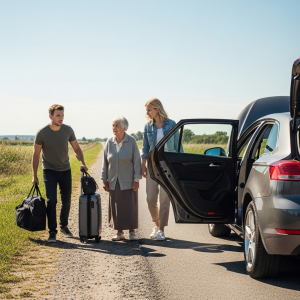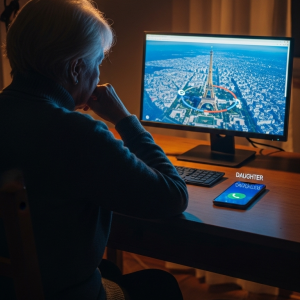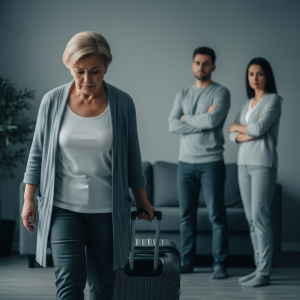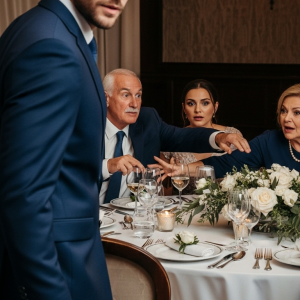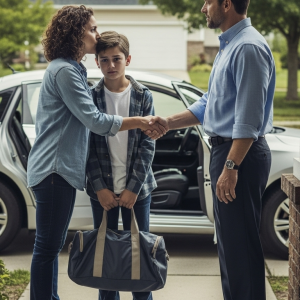The plan was simple. We’d leave early, with snacks in the back and coffee up front, for the four-hour drive to the family reunion across the Canadian border. It was supposed to be a normal, borderline boring trip, which, honestly, was the goal.
I was driving, as I always do. My husband, Mark, has a habit of braking at the last possible second, a trait I find less thrilling than he does. Besides, with my talent for motion sickness, it was better for everyone if I was in control. In the back, our three kids—ages ten, seven, and five—were a chaotic symphony of cartoons and arguments over the invisible lines drawn across the seat cushions.
It was fine. Not magical, not miserable, just fine. Until Mark said, “Turn the car around. Now.”
I didn’t react at first, just gave a little smirk, the kind of reflex you have when you think someone’s making a bad joke. “Why?” I asked, keeping my eyes on the road ahead.
He didn’t answer right away. His gaze was fixed on something far ahead, his knuckles white against his knees. “Please,” he said, his voice tight with an urgency that wasn’t a joke at all. “Just turn the car around.”
That’s when I knew. My husband doesn’t do panic. His default settings are calm and occasionally tired. I’ve seen him handle a kitchen fire with less tension. Without another word, I took the last exit before the border, a quiet, curved road that felt like it was offering us a second chance.
The moment our tires left the highway, his body relaxed, not completely, but enough for me to notice he’d been bracing for something. “Okay,” I said, pulling over onto the gravel shoulder. “Want to tell me what’s going on now?”
He shook his head. “Just drive. Anywhere but there.”
From the back seat, my middle child asked, “Are we going the wrong way?”
“We forgot something,” I said automatically, the lie tasting like ash in my mouth. My husband didn’t speak again for twenty long minutes. We drove in silence, miles of trees blurring past the windows, the weight of his unspoken fear pressing down on me.
Then he finally spoke. “Take the next turnoff.” It led to a narrow access road with no signs and no real purpose. I pulled over and killed the engine. In the sudden quiet, I could hear the heavy thud of my own heart.
“I need you to see it,” Mark said, his voice strained. He got out and walked to the back of the car. I followed, my stomach twisting into a knot. He opened the trunk, and for a moment, I just stared. Inside, nestled among our luggage and the kids’ backpacks, was a red duffel bag. It wasn’t ours.
He didn’t say anything; he just unzipped it. I looked inside and forgot how to breathe. It wasn’t fear, not yet. Fear was still on its way. What I felt in that moment was something slower, heavier—like falling through the floor of my own life.
The bag was filled with neatly sealed plastic packets of pills and powders. Dozens of them. Tucked inside a side pocket was a child’s toiletry bag, but instead of a toothbrush, it held wads of cash and a pair of handcuffs. Not hidden, not even cleverly. Just… there. As if the person who packed it either didn’t care if it was found or never expected anyone to look.
“They put that in our car,” I whispered, the words feeling foreign and impossible. I looked at Mark, my mind racing. “With the kids.”
He nodded, his face pale. “I didn’t notice until we were packing this morning. Your mom was distracting the kids, and your dad was ‘helping’ me with the big suitcase. He must have put it in then.”
I remembered my mom’s overly cheerful voice, how she’d insisted on checking if the kids had their favorite snacks. I remembered my dad clapping Mark on the shoulder, telling him what a good son-in-law he was. It was all a performance. A carefully staged distraction.
“They wouldn’t…” I started, but the words died in my throat. Because I knew they would. For years, I had been their safety net, the responsible one who cleaned up their messes. I paid their overdue bills when they spent too much on a fancy new TV. I co-signed a loan for their car when their credit was shot. I was the family “fixer,” the one who made their chaotic lives seem stable from the outside. But this… this was a different level of selfish.
“I heard them talking last night,” Mark said quietly, his eyes dark with a memory he hadn’t shared. “Through the heating vents. It wasn’t all clear, just bits and pieces. Something about this being the last time, about being ‘fully out’ once the delivery was made. I didn’t understand… until I saw the bag.”
We stood there in the heavy silence, the ugly truth laid bare between us. My parents weren’t just financially irresponsible. They were involved in something far more dangerous, and they had been willing to use their own daughter and grandchildren as unwitting mules to save themselves.
I didn’t cry. I didn’t scream. A cold, hard anger settled in my chest. I took out my phone and dialed my mother. She answered on the second ring, her voice bright and cheerful.
“Honey! Are you guys close? We were getting worried.”
“The bag, Mom,” I said, my voice dangerously calm. “What’s in the bag you put in our car?”
The silence on the other end was immediate and absolute. I could picture her face, the cheerful mask crumbling, replaced by panic. “I… I don’t know what you’re talking about.”
“Don’t lie to me,” I snapped. “I’m looking at it right now. The pills, the cash, the handcuffs. What did you think was going to happen when we crossed the border?”
Her voice returned, now a desperate whisper. “It was just a one-time thing, honey, I swear. We were in trouble, we needed the money… your father, he didn’t know how else to—”
“So you decided to risk your grandchildren?” I cut her off. “You were going to let us drive into another country with a trunk full of illegal substances?”
“It wasn’t like that!” she cried, her voice cracking. “No one was supposed to get caught! They told us it was safe!”
“‘They’?” I asked. “Who is ‘they,’ Mom?”
But she was sobbing now, incoherent words about debts and bad decisions and how it was all meant to fix everything. I felt nothing. The part of me that would have felt pity had been burned away.
“We’re not coming,” I said, my voice flat. “Not to the reunion. Not ever again. Don’t call me. Don’t contact my kids. We’re done.”
I hung up before she could reply. I knew what would follow: the screaming, the accusations, the final, desperate speech about family that she always used as a weapon. But I wouldn’t hear it this time. My husband looked at me, his eyes asking the silent question.
“We drive south,” I said. “We find a place to stay for a few days, and then we go home. And we never, ever look back.”
For months, the silence was a relief. We moved to a small town in North Carolina, drawn by the beautiful scenery and the promise of a fresh start. The kids settled into new schools. We found a small house and planted lavender in the front yard. It was quiet. It was ours.
Then, the messages started. Not from my parents, but from cousins, aunts, uncles. A carefully orchestrated campaign.
“Heard you abandoned your parents when they needed you most.”
“Your mother is heartbroken. She says you won’t even let her speak to her grandchildren.”
“Whatever you’re upset about, family should come first.”
They were trying to paint me as the villain, to isolate me, to make me doubt my own sanity. But it didn’t work. Because I had Mark, and I had the memory of that red duffel bag. I knew the truth, and this time, that was enough.
Years passed. The quiet life we had built for ourselves became our reality. The chaos of my past faded into a distant memory, something I only thought about on sleepless nights. The kids grew up, their lives filled with scraped knees, soccer games, and sleepovers, untouched by the toxicity I had escaped.
My parents never tried to contact me directly again. The family reunion became a story I told my husband in hushed tones, a defining moment that had saved us from a life we never knew we were seconds away from.
Then, one Wednesday morning, years later, I received a certified letter. The return address was from a law firm in my old hometown. My hands trembled as I opened it. It was a formal notice, informing me that my parents had been arrested in a major bust. They were facing serious charges.
The letter wasn’t from them. It was from a lawyer representing my grandparents—my mother’s parents. It was a simple, stark request: They would like to speak with you about taking custody of your sister’s children. They are not in a stable environment.
My sister, Karen. The one who was always in trouble, the one my parents had always enabled. I realized with a sickening lurch that my parents hadn’t stopped their dangerous activities after we disappeared; they had just found new, more desperate ways to continue. And now, my sister’s kids were paying the price.
I didn’t want to go back. I didn’t want to see the wreckage they had made of their lives. But I thought of those children, and I thought of the promise I had made to myself to be better, to do better.
The meeting took place in the same sterile law office where I imagined my parents were being processed. My grandparents looked old and tired, their faces etched with a deep, weary sadness.
“We didn’t know,” my grandmother said, her voice barely a whisper. “Not the full extent of it. Your mother… she was always good at pretending.”
My grandfather just shook his head. “We can’t let those kids go into the system. But we’re too old to raise them properly.” He looked at me, his eyes pleading. “We were hoping… we were hoping you would.”
I looked at these two people, themselves victims of their daughter’s choices, and I felt a pang of the old responsibility, the familiar pull to fix what was broken. But something was different now. This wasn’t about saving my parents from themselves. This was about saving two children who had done nothing wrong.
“I will,” I said, my voice clear and steady. “I’ll take them. But on one condition. My parents are never to have contact with them again. No calls, no letters, no third-party messages. They forfeited that right the day they put that bag in my car.”
My grandparents looked at each other, then nodded in solemn agreement.
That night, I told my husband everything. He didn’t hesitate for a second. “Of course we’ll take them,” he said, wrapping his arms around me. “Our family just got a little bigger, that’s all.”
And in that moment, I understood. Family wasn’t just about the blood you share. It was about the people who show up, who protect you, who choose you, even when it’s hard. My parents had failed me, but I wouldn’t fail those kids. Their broken legacy would stop with me. I would build a new one, grounded in safety, honesty, and the quiet, steady love I had found so far from home.
The plan was simple. We’d leave early, with snacks in the back and coffee up front, for the four-hour drive to the family reunion across the Canadian border. It was supposed to be a normal, borderline boring trip, which, honestly, was the goal.
I was driving, as I always do. My husband, Mark, has a habit of braking at the last possible second, a trait I find less thrilling than he does. Besides, with my talent for motion sickness, it was better for everyone if I was in control. In the back, our three kids—ages ten, seven, and five—were a chaotic symphony of cartoons and arguments over the invisible lines drawn across the seat cushions.
It was fine. Not magical, not miserable, just fine. Until Mark said, “Turn the car around. Now.”
I didn’t react at first, just gave a little smirk, the kind of reflex you have when you think someone’s making a bad joke. “Why?” I asked, keeping my eyes on the road ahead.
He didn’t answer right away. His gaze was fixed on something far ahead, his knuckles white against his knees. “Please,” he said, his voice tight with an urgency that wasn’t a joke at all. “Just turn the car around.”
That’s when I knew. My husband doesn’t do panic. His default settings are calm and occasionally tired. I’ve seen him handle a kitchen fire with less tension. Without another word, I took the last exit before the border, a quiet, curved road that felt like it was offering us a second chance.
The moment our tires left the highway, his body relaxed, not completely, but enough for me to notice he’d been bracing for something. “Okay,” I said, pulling over onto the gravel shoulder. “Want to tell me what’s going on now?”
He shook his head. “Just drive. Anywhere but there.”
From the back seat, my middle child asked, “Are we going the wrong way?”
“We forgot something,” I said automatically, the lie tasting like ash in my mouth. My husband didn’t speak again for twenty long minutes. We drove in silence, miles of trees blurring past the windows, the weight of his unspoken fear pressing down on me.
Then he finally spoke. “Take the next turnoff.” It led to a narrow access road with no signs and no real purpose. I pulled over and killed the engine. In the sudden quiet, I could hear the heavy thud of my own heart.
“I need you to see it,” Mark said, his voice strained. He got out and walked to the back of the car. I followed, my stomach twisting into a knot. He opened the trunk, and for a moment, I just stared. Inside, nestled among our luggage and the kids’ backpacks, was a red duffel bag. It wasn’t ours.
He didn’t say anything; he just unzipped it. I looked inside and forgot how to breathe. It wasn’t fear, not yet. Fear was still on its way. What I felt in that moment was something slower, heavier—like falling through the floor of my own life.
The bag was filled with neatly sealed plastic packets of pills and powders. Dozens of them. Tucked inside a side pocket was a child’s toiletry bag, but instead of a toothbrush, it held wads of cash and a pair of handcuffs. Not hidden, not even cleverly. Just… there. As if the person who packed it either didn’t care if it was found or never expected anyone to look.
“They put that in our car,” I whispered, the words feeling foreign and impossible. I looked at Mark, my mind racing. “With the kids.”
He nodded, his face pale. “I didn’t notice until we were packing this morning. Your mom was distracting the kids, and your dad was ‘helping’ me with the big suitcase. He must have put it in then.”
I remembered my mom’s overly cheerful voice, how she’d insisted on checking if the kids had their favorite snacks. I remembered my dad clapping Mark on the shoulder, telling him what a good son-in-law he was. It was all a performance. A carefully staged distraction.
“They wouldn’t…” I started, but the words died in my throat. Because I knew they would. For years, I had been their safety net, the responsible one who cleaned up their messes. I paid their overdue bills when they spent too much on a fancy new TV. I co-signed a loan for their car when their credit was shot. I was the family “fixer,” the one who made their chaotic lives seem stable from the outside. But this… this was a different level of selfish.
“I heard them talking last night,” Mark said quietly, his eyes dark with a memory he hadn’t shared. “Through the heating vents. It wasn’t all clear, just bits and pieces. Something about this being the last time, about being ‘fully out’ once the delivery was made. I didn’t understand… until I saw the bag.”
We stood there in the heavy silence, the ugly truth laid bare between us. My parents weren’t just financially irresponsible. They were involved in something far more dangerous, and they had been willing to use their own daughter and grandchildren as unwitting mules to save themselves.
I didn’t cry. I didn’t scream. A cold, hard anger settled in my chest. I took out my phone and dialed my mother. She answered on the second ring, her voice bright and cheerful.
“Honey! Are you guys close? We were getting worried.”
“The bag, Mom,” I said, my voice dangerously calm. “What’s in the bag you put in our car?”
The silence on the other end was immediate and absolute. I could picture her face, the cheerful mask crumbling, replaced by panic. “I… I don’t know what you’re talking about.”
“Don’t lie to me,” I snapped. “I’m looking at it right now. The pills, the cash, the handcuffs. What did you think was going to happen when we crossed the border?”
Her voice returned, now a desperate whisper. “It was just a one-time thing, honey, I swear. We were in trouble, we needed the money… your father, he didn’t know how else to—”
“So you decided to risk your grandchildren?” I cut her off. “You were going to let us drive into another country with a trunk full of illegal substances?”
“It wasn’t like that!” she cried, her voice cracking. “No one was supposed to get caught! They told us it was safe!”
“‘They’?” I asked. “Who is ‘they,’ Mom?”
But she was sobbing now, incoherent words about debts and bad decisions and how it was all meant to fix everything. I felt nothing. The part of me that would have felt pity had been burned away.
“We’re not coming,” I said, my voice flat. “Not to the reunion. Not ever again. Don’t call me. Don’t contact my kids. We’re done.”
I hung up before she could reply. I knew what would follow: the screaming, the accusations, the final, desperate speech about family that she always used as a weapon. But I wouldn’t hear it this time. My husband looked at me, his eyes asking the silent question.
“We drive south,” I said. “We find a place to stay for a few days, and then we go home. And we never, ever look back.”
